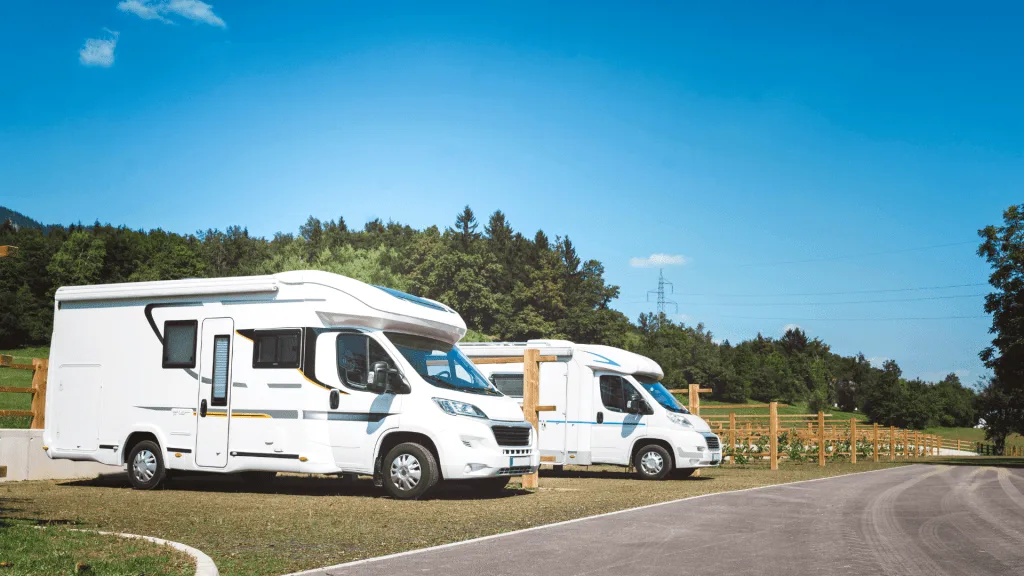If you’re rolling into your neighborhood after a long day of driving, it can be tempting to park your RV in front of your house. But the last thing you want is to wake up to a costly ticket stuck to your windshield.
A reader recently asked, “I’m leaving on an extended RV trip and must pack all the travel necessities. This process will realistically take a few days. Can I park my RV in front of my house for multiple days?”
Today, we’re getting into the nitty gritty of on-street parking to answer your burning question.
Let’s roll!
Why Would You Park Your RV in Front of Your House?
This question applies to many situations.
You might find yourself desperate for an overnight parking spot. Or maybe your storage solution has fallen through, leaving you without a safe place to keep your ride. You might be building a permanent home and need somewhere to stay in the meantime.
Whatever your reasons for leaving your motorhome in front of your house, you’ll want to understand the rules of the road before getting too comfortable.
Is It Legal to Park an RV in Front of Your House?
While no federal laws say you can’t park an RV in front of your house, each state, city, and even neighborhood has its own rules. If you have an HOA, a fine for leaving your camper out overnight is almost guaranteed.
Parking a small car on the street, let alone a motorhome, is illegal in many cities. But some of these strict municipalities allow you to store your rig on private property if you aren’t blocking the sidewalk. So while you can’t leave it on the road, you can keep your RV in your side yard.
Other places allow you to leave your camper on the road for a specified time as long as you have a permit. While most of these permits only cover a few days, some allow for long-term options.
We recently had to pack our RV for a two-month trip. Unfortunately, the easiest solution for us was making multiple car trips back and forth to the storage unit. It was a three-day process.

How Long Can You Park an RV in Front of Your House?
The length of time you can park your RV in front of your house varies by jurisdiction. Many places even limit the time a motorhome can stay in your driveway or restrict the size of your rig if you’re in a residential area.
There may be restrictions on where you can keep a recreational vehicle overnight. And many places don’t allow campers to pull over on the street at all.
It isn’t that these places are anti-motorhome. They simply lack the space and infrastructure for such large vehicles.
Pro Tip: Beware of these Consequences of Illegally Parking Overnight before you park up for the night.

Where Do You Park Your RV When Not in Use?
Finding a safe and suitable place to store your RV can be tricky, and determining the best solution depends on how long it’ll be stationary, among other factors.
Here are a few of the best places to park your camper when your house isn’t an option.
Storage Facilities
Storage facilities are a great choice if you can’t park your RV in front of your house long-term. And you’ll have a lot to choose from. Many places have 24-hour security, so you’ll feel safe leaving your rig for long periods.
Outdoor storage will be the cheapest option, but it won’t protect your rig from the elements. Covered facilities have a little more security but aren’t the best way to ensure their safety. If your motorhome is stationary for long, you’ll want to put it in a climate-controlled, indoor unit.
Remember that your RV still needs a little love, even when stored properly. You’ll want to fire up the engine and get the tires moving regularly to keep it in good condition.
Campgrounds or Resorts
Campgrounds often have designated spaces for unoccupied parking. In some cases, you may even have access to resort amenities! These rates will be lower than the regular camping fee but can still be a bit pricey.
It’s essential to check with management to ensure you meet all the rules and regulations. They likely have time restrictions and other specifications. Still, they’re a great option, especially if you don’t need a long-term solution.
RV-Specific Parking Areas
These designated areas are often secure, gated areas where you can store your rig when not in use. Some may have shade trees to protect your camper from the elements or even covered RV parking areas much better than your house.
These spots are typically close enough to town for convenience but far enough from city centers to be economical. You won’t find many amenities on-site, but they won’t be far.
Private Property
Of course, if you have space at home and your local regulations permit it, parking on your own property is the cheapest option. Plus, you’ll be able to monitor your RV closely.
But when you can’t leave your rig at your own house, you might be able to leave it at someone else’s. See if a trusted friend will accept a small payment in exchange for storage space. They might even be willing to barter with you if you have any valuable skills.

Things to Consider When Selecting RV Parking Options
You’ll have a lot to think about when choosing where to store your RV. First, it’s helpful to find somewhere close by so you have easy access to your motorhome. You won’t want to spend too much time on the road just to get to your camper. After all, you’ll want to check on it and run the engine as often as possible.
It’s also essential to pick a safe place to leave it. Your rig can be targeted for theft and vandalism, so an area with gated access and 24-hour cameras is your best bet.
The length of time you’ll be parked will determine whether you need covered or indoor storage. An outdoor spot is fine if you’re on a quick stopover. But don’t leave your investment out in the elements for too long.
Pro Tip: Don’t know where to park for the night? We found the top Stores That Allow Overnight Parking.
Should You Park Your RV in Front of Your House?
If you’re lucky enough to live in an area that allows you to park your RV in front of your house, there’s no reason not to take advantage of it! Of course, you won’t want it to sit there collecting dust for a long time, but access is conveniently right outside your door.
For the rest of us, there are plenty of other options. Whatever you choose, remember to find a safe and secure place so you don’t put your investment at risk.
We’ll Help You Find the Best Free Camping in the USA
You should give it a try!
As a matter of fact, these free campsites are yours to enjoy. Every time you pay federal taxes, you’re contributing to these lands.
Become a FREE CAMPING INSIDER and join the 100,000 campers who love to score the best site!
We’ll send you the 50 Best Free Campsites in the USA (one per state). Access the list by submitting your email below: